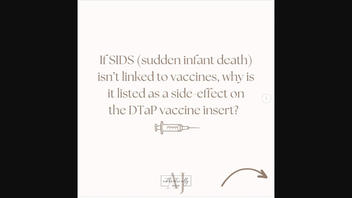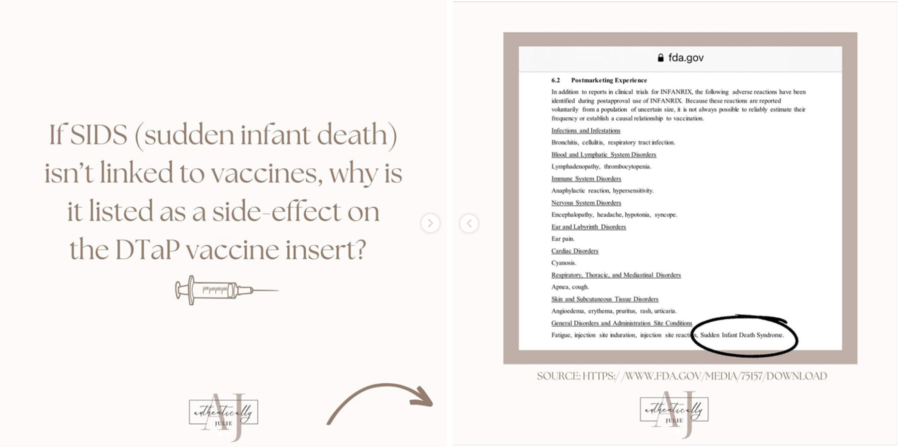STORY UPDATED: check for updates below.

Does an insert included in the packaging for one diphtheria, tetanus and pertussis (DTaP) vaccine show a direct link between immunization and sudden infant death syndrome (SIDS)? No, that's not true: A spokesperson for the Centers for Disease Control and Prevention (CDC) told Lead Stories that there is no established causal link between the two DTaP vaccines available in the U.S. and SIDS. While it is true that at least one Food and Drug Administration (FDA) packaging insert lists SIDS as a self-reported outcome following immunization, an immunologist told Lead Stories that such reports do not provide "any evidence of causality." Four decades of research conclude that DTaP vaccines do not cause SIDS, and may in fact reduce the rate of death from the condition.
A version of the claim resurfaced in a slideshow post on Instagram on September 7, 2023, (archived here). A caption that accompanied the post read:
The most frustrating thing about this whole topic is these "experts" claim that there is no causal connection and it cannot be proven. However, they won't do any real studies on vaxxed versus unvaxxed children. So they'll just continue to gaslight parents into thinking that injecting multiple vials of toxins is the only way to keep their babies safe. Because if they actually conducted studies and used REAL placebos, it would be glaringly obvious that shots do cause SIDS.
Below is how the two slider images appeared at the time of this publication:
(Source: Lead Stories screenshot taken Thurs Sept 14 20:29:10 UTC 2023)
The first slide shown above strongly implied that vaccines cause SIDS, on the basis that SIDS is "listed as a side effect" on an FDA packaging insert for the Infanrix DTaP vaccine.
In an email to Lead Stories received September 14, 2023, a CDC spokesperson wrote that "Vaccines have not been shown to cause sudden infant death syndrome" and referred our newsroom to an agency explainer that stated:
Multiple research studies and safety reviews have looked at possible links between vaccines and SIDS. The evidence accumulated over many years do not show any links between childhood immunization and SIDS.
Dr. Stanley Perlman, a professor of microbiology and immunology at the University of Iowa Carver College of Medicine, told Lead Stories that there is no research to suggest a causal link between DTaP vaccines and SIDS.
SIDS is the leading cause of death in children under 1
SIDs is the unexplained death of an infant less than a year old who is otherwise deemed healthy and is the leading cause of death in children under one year of age, writes the Boston Children's Hospital.
That vaccines cause SIDS is a longstanding - yet unfounded - claim that can be traced to a 20/20 news program that aired in 1999 suggesting that the Hepatitis B vaccine caused the death of an infant.
However, due to the prevalence of vaccines administered to children within the first year of life, DTaP included, it is statistically likely that a child will die of SIDS following immunization.
For example, an estimated 80 percent of children will be given four or more doses of DTaP vaccination by 24 months - and that number increases when considering all vaccines recommended to be administered to children. Given how prevalent DTaP vaccination is, the science fact checking institution Health Feedback affirms that it is statistically inevitable that some SIDS cases will happen after vaccination. Chronological correlations of that kind can be simple coincidence and do not prove causation
"Since immunizations are given to about 90 percent of children less than 1 year of age, and about 1,600 cases of SIDS occur every year, it would be expected, statistically, that every year about 50 cases of SIDS will occur within 24 hours of receipt of a vaccine. However, because the incidence of SIDS is the same in children who do or do not receive vaccines, we know that SIDS is not caused by vaccines," wrote the Children's Hospital of Philadelphia in a 2019 blog post.
Furthermore, the incidence of SIDS is the same in children who do or do not receive vaccines, we know that SIDS is not caused by vaccines. But there is no causal link. Given the numbers of children vaccinated, if there were a causal link, SIDS would be much more prevalent than it is.
There are two DTaP vaccines available in the U.S.
As of September 2023, the National Institutes of Health notes that there are currently two manufacturers of the DTaP vaccine in the U.S.: GlaxoSmithKline Biologicals (GSK), which manufactures Infanrix, and Sanofi Pasteur, which makes Pentacel.
Neither of the above vaccines has been shown to cause SIDS, An FDA spokesperson confirmed to Lead Stories in an email received September 18, 2023:
The FDA is aware of reports to the Vaccine Adverse Event Reporting System (VAERS) of SIDS and the Diphtheria and Tetanus Toxoids and Acellular Pertussis (DTaP). However, the numbers of reports are very low relative to the large number of infants who have received these vaccines.The FDA has not determined that there is a safety concern associated with these reports. The inclusion of an adverse event from spontaneous reports in labeling, such as SIDS, does not mean that that the adverse event was caused by the vaccine. It is important to note that VAERS collects data on any adverse event following vaccination, be it coincidental or truly caused by a vaccine. The report of an adverse event to VAERS is not documentation that a vaccine caused the event.
Lead Stories examined both immunizations below.
Infanrix: Voluntary reports do not prove causation
An examination of the package inserts for Infanrix listed "Sudden infant death syndrome" among a range of adverse effects, including respiratory illnesses and immune system and nervous system disorders, under the "postmarketing experience" section at the bottom of page 11. However, this section includes only voluntary reports of adverse medical events experienced by people after having received the vaccine and, as such, no definitive causal link can be drawn between immunization and SIDS. Without any verification or follow-up, which the vaccine insert makes clear:
Because these reactions are reported voluntarily from a population of uncertain size, it is not always possible to reliably estimate their frequency or establish a causal relationship to vaccination.
These voluntary statements are not to be equated to, say, a clinical study or peer-reviewed research.
"Like all vaccines, [the DTaP] is administered to induce an immune response against the pathogen protein in the formulation. The notion is that the inflammatory or immunological response induced by a component of the vaccine could have an unexpected effect on an infant's brain. There could also be an undesirable allergic response. The mechanism of action of the vaccine does not provide insight into how it might cause SIDS," Perlman told Lead Stories in an email received September 13, 2023.
"These are voluntary reports of events that may have been temporally linked to the vaccination without any evidence of causality. The list includes multiple diseases."
Any such outcomes, as the insert reads, are voluntarily admitted to the drug manufacturer, and "it is not always possible to reliably estimate their frequency or establish a causal relationship to vaccination."
The drugmakers also contend that such reports are not proven to be correlated to immunization.
"As described in the Infanrix prescribing information, in addition to reports in clinical trials, also included are worldwide voluntary reports of adverse events received for Infanrix since it was introduced to the market," Alison Hunt, a spokesperson for GSK, told Lead Stories in an email received on September 13, 2023.
"These adverse events were reported voluntarily from a population of uncertain size; therefore, it is not always possible to reliably estimate their frequency or establish a causal relationship to vaccination."
Pentacel: Reported deaths and causes in the vaccine information packet
The Pentacel prescribing information package insert also listed SIDS as a serious adverse event, stating that a total of five deaths occurred throughout a course of studies among children who received Pentacel. These deaths were attributed to asphyxia due to suffocation, head trauma, sudden infant death syndrome, and neuroblastoma.
Perlman said again, that this report does not not prove any direct outcome.
"No causality was shown; rather there was a temporal linkage that needed to be noted. A good example is that head trauma was listed in the list of deaths, and is very unlikely to have been caused by the vaccine," Perlman told Lead Stories.
A Sanofi spokesperson confirmed to Lead Stories that one death due to SIDS occurred in a four-and-a-half-month-old infant during "study 494-03," with the infant having received one dose 52 days prior. This death was "considered as unrelated to the immunizations by the investigators."
This randomized, open-label study was designed to assess the safety of Pentacel when co-administered with other vaccines at the recommended schedules. The information pertaining to this particular case was publicly disclosed in the FDA's clinical review and is archived here.
"As the peaks in the incidence of SIDS occur at the age range when the infants receive the routine vaccination, a potential link between sudden unexpected deaths and vaccinations has been evaluated by many research groups," wrote the spokesperson in an email received September 20, 2023.
"The summary of available evidence suggests that there is no causal association between childhood immunization (including vaccination with DTaP vaccines) and SIDS."
An examination of four decades of research
To further validate our conclusion, Lead Stories also examined four decades of research examining potential relationships between SIDS and vaccines. Similarly, we found there was no direct connection between the two:
Three studies in the 1980s found that there was "no increase in the risk of SIDS after immunization with the DTP vaccine," one of which included an examination of nearly 130,000 children.
In 1995, researchers found that victims of SIDS were not significantly more often vaccinated than other immunized children.
Research published in 2007 provided support that immunization may actually reduce the risk of SIDS. These results were confirmed by a 2015 study that found increased immunization "coverage is associated with decreased SIDS mortality."
A 2015 analysis of Vaccine Adverse Event Reporting System (VAERS) data between 1997 and 2013 did not find a concerning pattern between SIDS death reports and vaccines.
Lead Stories has debunked other false claims connecting vaccines to SIDS, including that vaccines are not made of dangerous levels of toxic ingredients linked to the condition, that it is not true that 58 percent of SIDS cases reported to VAERS happened within three days of vaccination and 78.3 percent within seven days, and that nearly 80 percent of the babies who died of SIDS did not have a vaccine the same day.
Updates:
-
2023-09-19T18:44:47Z 2023-09-19T18:44:47Z Adds comment from FDA spokesperson. Adds details from Sanofi spokesperson's email received September 20, 2023.


















